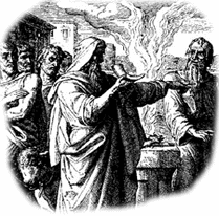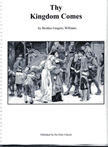Chapter 3. The Altar of Abraham
Part 2 The Altar of Sin

In the days of Joseph’s famine,
the people had given their gold, their animals, their land, and
themselves in exchange for provisions. So, what did they use for
money in everyday business transactions? They used a small stone or
clay scarab given out by the City Treasury. The priests of Egypt
administered this financial system, living through the famine on a
donation from the Pharaoh. They grew wealthy while others toiled.
They had vast stores of grain which they controlled as an utility,
loaning it out at interest.
In their temple “granaries…
priests became bankers through the loan of seed grain. In many
societies the main temple and dependent structures were the most
important buildings, although many smaller, often isolated, temples
existed as well.” These temples were the centers of commerce and control and the
depositories of records and contracts.
“Give
me control over a nation’s currency and I care not who makes
its laws”
The High Priests knew the arts of the
temple, which was, at the least, a central bank. They had control of
the flow of currency which could be redeemed by foreign traders
through the gates of the city, but was a regulated fiat money for the
subject citizenry.
It was the greed and envy of Joseph’s
brothers that had brought all of Israel under the power of the
Pharaohs and at the mercy of the priests of Egypt. They were to be
the Altar of God as ministers in His kingdom on earth, but instead
they became the bricks and stones of a ruling elite.
In Egypt, two-and-a-half month's worth
of labor each year went to the government. All the gold and silver
was in the treasury and the people held a mere legal title to
their land and their possessions.
Moses became the son of the daughter
of Pharaoh by adoption, but he saw himself becoming a tyrant and
murderer like Cain and Lemech. He fled from this temptation and
sought the ways of God.
God saw that the people, too, were
corrupted by this bondage and He sent Moses back to lead the people
out of Egypt and desired that they never return to such a system.
“But
he shall not… cause the people to return to Egypt … Ye
shall henceforth return no more that way.” Deuteronomy 17:16
God chose His people from Abraham’s seed of faith and led them out of the civil powers of Egypt.
He would be their God and Ruler through their hearts and minds, but
they did not have the faith of their forefather, nor of Moses. They
feared for their lives and sought strength in their own numbers and
bound themselves together by surety and sacrifice, placing the wealth
of their families in Aaron’s altar of the golden calf.
“… And
all the people brake off the golden earrings which [were] in their
ears, and brought [them] unto Aaron. And he received [them] at their hand, and fashioned it with a graving tool, after he
had made it a molten calf: and they said, These [be] thy gods, O
Israel, which brought thee up out of the land of Egypt.” Exodus
32:2, 4
What possessed them to make that
golden calf? It was not mere superstition that motivated them, but a
practicality and a lack of faith. The people literally deposited
their gold, as well as other goods and sacrificed their rights to
them on the altar of the golden calf. They took, in turn, some sort
of exchangeable token and the promise of social security.
“Cast
in thy lot among us; let us all have one purse: My son, walk not thou
in the way with them; refrain thy foot from their path: For their
feet run to evil, and make haste to shed blood. Surely in vain the
net is spread in the sight of any bird. And they lay wait for their
own blood; they lurk privily for their own lives. So are the ways of
every one that is greedy of gain; which taketh away the life of the
owners thereof.” Proverbs 1:14-19
Gold was deposited into a large statue
for all to see. The wealth and the community was melded together into
a common purse. No one person could leave in the face of an enemy
without leaving behind the golden depository of their wealth. Moses
could take the people out of Egypt, but only God, time, and
repentance could take Egypt out of the people.
“… I
will smite the shepherd, and the sheep shall be scattered.” Zec 13:7
Without men of faith like Moses,
David, or Jesus Christ, the people become frightened. In their fear,
they reach out for something else other than God to secure their
safety.
In Egypt’s central banking
system, the temple issued clay and stone scarabs as a
substitute for commodity money like gold and silver. Those scarabs,
or tokens of exchange, were worthless except in that monetarily-bound
community. The priests of the temple in Egypt had kept track of all
the complexities of their centralized monetary system and, of course,
they profited from its management. Allegiance was assured with no
true wealth in the hands of the people.
“For
where your treasure is, there will your heart be also.” Luke 12:34
Was the sin the golden statue or the lack of faith it represented? Men gave away their God-given
rights and liberty in exchange for the promises of men. The altar
upon which they now sacrificed was hewn with the hands of men and
regulated by a ruling elite of that central depository or national
bank. They had returned to Egypt with a new god.
“They
have turned aside quickly out of the way which I commanded them: they
have made them a molten calf, and have worshipped it, and have
sacrificed thereunto, and said, These [be] thy gods, O Israel, which
have brought thee up out of the land of Egypt.” Ex. 32:8
Return to Index of Chapters of "Thy Kingdom Comes"

Order the book
Thy Kingdom Comes
http://www.hisholychurch.org/order/materialskingdom.html










